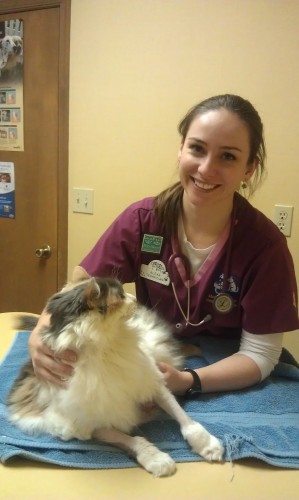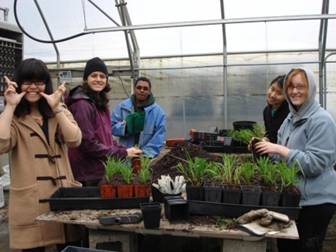F. Alexa Warburton ‘09.5 talks about what she loves about working as a veterinary technician with Marlboro Village Veterinary Hospital, applying to veterinary school, and her path to a career in veterinary medicine.

Current job title: Veterinary Technician, Will be attending veterinary school this fall 2012, undecided on where I will attend.
Class year: 2009.5
Major: Biology
Where did your interest come from to work in this career?
My interest in veterinary medicine arose when I was young (around 9 years old) and joined my local Easy Riders 4-H Club where I became obsessed with the care and maintenance of horse husbandry. From mucking stalls to pulling maggots out of an open wound to having to know the anatomy of the horse, my desire to go into an animal related field flourished.
However, it was not only my personal awe and fascination that drew me to the veterinary field, but my parents love for medicine as well. As the only child of a second marriage for both my doctor parents, I am their last hope of becoming the next family physician. I grew up watching the 6pm news and listening to them rattling off medical jargon galore, to which my response was to look at the family dog and sigh. Chappy, our labrador retriever, would stare back aimlessly, agreeing that the emergency splenectomy was not nearly as interesting as the food on our plates. Today my parents’ medical terminology is much more intellectually stimulating to me. I find myself connecting the drugs used by their patients to similar medications prescribed at the animal hospital.
Post college graduation I went to work in two different small animal hospitals, partook in an equine externship and took continuing education courses for veterinary technicians. In the variety of animal experience I have partaken in I always find myself coming back to animal medicine.
Becoming a veterinarian is not dismissing my chance to make an impact on human health and medicine, but rather it is an opportunity to become a part of one medicine for all. A vet is being a human psychologist when an owner is putting it’s “fifth” member of the family (their dog or cat) to sleep. It’s being a pharmaceutical researcher when offering a new experimental drug to a patient that may lead to great promise for future pets and possibly humans. Veterinarians are also public health officials aiding in the understanding (and thus prevention) of such maladies as food-borne, degenerative and neoplastic illnesses as well as infectious zoonotic diseases associated with increasing human-animal interaction. The interconnectedness between human and animal medicine is vast, and by becoming a vet I would be allowed to participate in the healing of all living creatures.
What are typical entry level positions in your field and what does a career path look like?
In some states you are not required to be a licensed veterinary technician and that is how I became employed at Marlboro Village Veterinary Hospital in New Jersey. Previously I had worked as a veterinary technician in PA and my experience restraining animals, starting IV fluids, administering basic medications helped me to obtain the job as a veterinary technician.
Normally students volunteer at a humane shelter or work as veterinary assistant before applying to veterinary school. I was very fortunate to work as a veterinary technician and gain even more experience. This job is temporary until I start veterinary school in the fall 2012.
How did you find the current position you have?
A woman I worked with at Companion Animal Hospital in Selinsgrove, PA was leaving Marlboro Village Veterinary Hospital to go to the School of Veterinary Medicine at the University of Pennsylvania. She mentioned to me that they were looking for applicants and urged me to apply. I applied and was offered the job starting in September 2011.
While I was applying to jobs this past summer 2011, my experiences gained at Middlebury specifically my honors thesis on the spatial strategy preference of Octopus bimaculoides, impressed many potential employers and got my foot in the door.
As I was applying to veterinary school this past year I believe the rigor of Middlebury academics was known and having a strong GPA from the college in addition to receiving honors for my thesis impressed the interviewers and admission staff.
Starting veterinary school this upcoming fall I believe my comparative vertebrate and invertebrate anatomy, developmental biology, and animal physiology courses taken at Middlebury will aid my in excelling in the first year veterinary school curriculum.
What experience should a college student obtain to be marketable?
A student needs to have small animal veterinary experience, large animal veterinary experience (equine and bovine are a must, porcine, chicken, goat and sheep can only strengthen your application as well), research experience (completing a thesis at Middlebury is sufficient, but trying to get involved in a summer research project outside of Middlebury can help too), wildlife experience and some exotics. Now this is quite intimidating! But doable because what you must realize is that every little bit counts. You do NOT need 500 hours of each! You just need to demonstrate that you have at least dabbled in different animal related fields.
What skills do you think a person needs to be successful in your position?
Experience, experience, experience. What I’ve been told over and over is to get into the veterinary field you need to have it all – research experience, large animal veterinary experience, small animal veterinary experience, exotics, wildlife, etc. The more the better because it shows that not only do you understand all the facets the field has to offer but you have seen them at a working/volunteering level.
What do you like best/least about your work?
Best, the patients. When a dog comes in as an emergency after eating 6 Mucinex and then can go home that evening after being given the works makes you feel confident of your saving abilities. The trust that dogs, cats, birds, reptiles, lagomorphs, etc. have by letting you poke and prod at them to try and gain information regarding the cause of their illness is truly amazing. Least, the costs. Few owners have veterinary insurance for their pets, so as a result they must pay all their medical bills upfront. This limits the veterinarian’s ability to best treat some patients because money becomes the main issue. Especially now with the downturned economy I think owners are hesitant at taking the extra leap and getting an ultrasound, dental, etc. for their dog or cat. These two procedures help save so many animals lives, but the cost is a quick deterrent for the clients. I do have optimism that in the coming years veterinary insurance will become common place, allowing future vets to offer procedures and techniques that many could not afford prior.
What does an average day or week look like for you?
My responsibilities on a day to day basis involve recording patient information in medical records during and after hospital visits, assisting the doctor in surgery, performing radiographic studies, performing laboratory studies on fecal and urine samples, preparing blood work to be sent out, administering anesthetic agents and monitoring patients during anesthesia, performing dental prophylactic scalings and oral examinations, completing in-house treatments on hospitalized patients, maintaining the inventory for the practice, and communicating with pet owners regarding pet loss, current diagnoses and preventive health. In addition I was trained to draw blood, start IV catheters and intubate patients.
What books, web sites, or other resources should students take advantage of now to learn about the field?
- Association of American Veterinary Colleges: http://www.aavmc.org/
- Veterinary Medical School Admissions Requirements (VMSAR). Definitely buy this book. http://www.aavmc.org/Publications/VMSAR.aspx
- While applying to veterinary school this forum is incredibly helpful. You can ask questions, find out when other students heard from schools and learn what is necessary to apply. http://forums.sdn.net/forumdisplay.php?f=73
- What schools specific requirements are: http://www.aavmc.org/College-Specific-Requirements/College-Specific-Requirements_College-Specifications.aspx
- To learn the most up to date veterinary news join this daily email update. Very helpful before interviews to know what’s currently going on in the field: http://www.smartbrief.com/getLast.action?mode=sample&b=avma
What do you think is the next step in your career plan?
This fall 2012 I will be attending veterinary school and am currently in the process of trying to decide where I will go. So-far I was accepted into four schools – University of Missouri College of Veterinary Medicine, Iowa State University College of Veterinary Medicine, School of Veterinary Medicine at the University of Pennsylvania, and Cummings School of Veterinary Medicine at Tufts University. The opportunity to attend veterinary school this upcoming school year is a dream come true and to be afforded the opportunity to choose where I want to attend is unbelievable!
To apply for the Veterinary Technician position with Marlboro Village Veterinary Hospital by March 1st, Go/MOJO.








